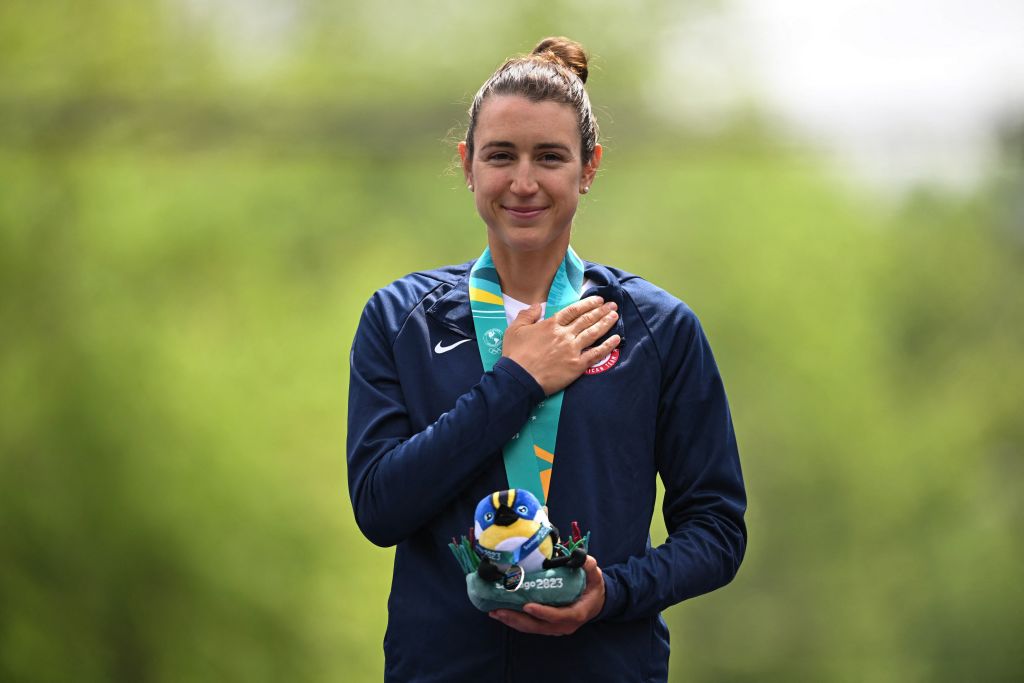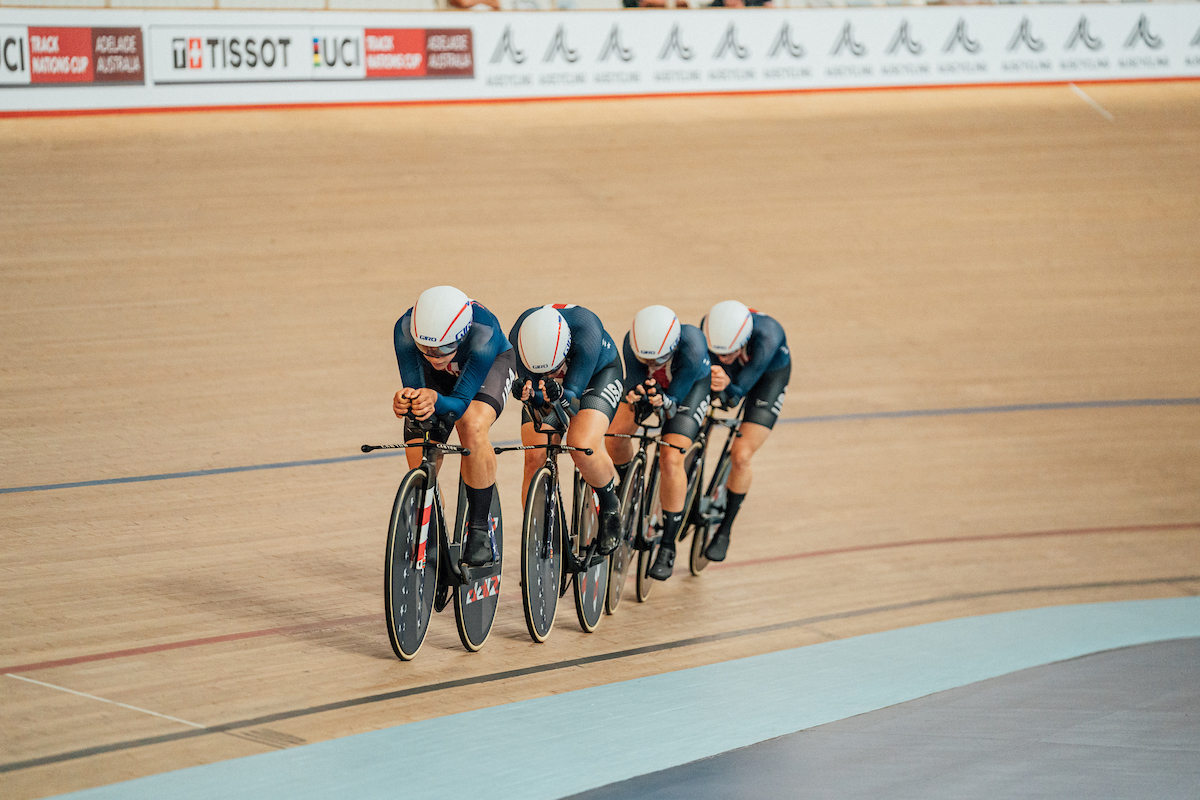
Kristen Faulkner begins her double-discipline duty for Team USA at the Paris Olympic Games on August 4 in the women’s road race, followed by Team Pursuit rounds on the track on August 6 and 7. While she was a world-class rower and moved to pro road cycling in the last five years, track cycling proved to be the magnet for a first-time appearance at the Olympic Games and satisfy the desire for “exhilaration” and competition in a true team environment.
While Faulkner won her first US Pro road race national championship this year, it did not provide automatic qualification to the Olympics like the time trial. She went into the ITT as the reigning Pan-American Champion, but finished second to Taylor Knibb at the Nationals. So the day after winning the road race, she flew to Belgium to take part in a final selection camp for the US track team in Zolder, where a last piece of the Paris puzzle fell in place.
“My goal was to make the team for track, and that has been the goal since last fall,” she told Cyclingnews for her Olympic debut.
“[In May], I flew from USA National Champions directly to Zolder. Some news outlets were saying that track was my backup and it was only because I didn't make the TT nationals, but I had been planning to go to Zolder all year. Team Pursuit is and has always been my number one priority.”
Faulkner had taken some turns on an outdoor track, San Jose Velodrome in California, when she first began racing in 2019 and 2020, but used what she called her “mass-start” road bike. Her first try in a group effort came at a Team Pursuit camp with USA Cycling in October 2022, and she said “that was the first time where I decided to really try out for the track team”.
She was then selected to train in Adelaide, Australia in January and try out for the team at a Nation’s Cup race the first weekend of February. She called the result “pretty good”, riding with the US team to fifth, alongside Olympic Omnium gold medalist Jennifer Valente, Lily Williams and 20-year-old Olivia Cummins.
“They told me that if I wanted to make the Olympic team, I had to race at least once with them, and so I went to Australia with the goal to make the team that would compete at the Nation's Cup there,” Faulkner explained, with there being no guarantee she’d even qualify for the event. From Australia, she then returned with the EF-Oatly-Cannondale squad for road racing in Europe in mid-February.
“It was challenging because I'm new to the track program, but I also have a full road season, and so there's limited time for me to kind of train and race with the track team. I think we had a pretty good race, actually. Then after that, I was invited back to a team camp in Zolder in Belgium, back in May. And so Australia was a really pivotal time.”
At the final selection camp in Zolder, five riders made the team. Returning to the Olympic Games would be Tokyo Games teammates Valente, Williams and Chloe Dygert, who were part of the squad that earned a bronze medal. Faulkner was named to the Team Pursuit squad along with Cummins, who was part of a collegiate gold medal at USA Cycling Track Nationals in 2023 and also an Olympic debutant.
“To be honest, it's quite exhilarating. I love the speed,” Faulkner said about why she liked the track so much. ”It gives me the same sense of exhilaration in some ways that you get descending on a bike. It's just the speed that's really fun.”
However, the path to Paris wasn’t all fun and turned out to be more of a conundrum even without the final Team Pursuit selection. The 31-year-old suffered a concussion in April, which set back preparations for the US Pro Nationals.
“I was quite stressed about it, because I knew that before that I had really, really good form and fitness,” said Faulkner, who had won Omloop van het Hageland, two stages of Trofeo Ponente in Rosa and finished sixth at Strade Bianche Donne in her spring road campaign.
“I was quite disappointed to be injured during a critical training time. When I came back from that injury, I was pretty full gas trying to get fit for the Vuelta a España first, and then USA Nationals. At the Vuelta, my sub-five-minute power was good, but my 20-minute threshold power had really suffered from my concussion in April, and I knew that I lost a lot of fitness.
“Unfortunately, I didn't have enough time to get back in shape fully before Nationals, which was quite disappointing. But I do think that by the time Zolder came around, I was almost back at full fitness. It was just after a really big month of just push, push, push, and doing what I had to do to make the Olympic team.”
In June she rode two days at the Tour de Suisse Women for EF-Oatley-Cannondale and withdrew, deciding to “lay off the gas and give myself a break”. She’s now healthy and 100% ready for the Olympic Games.
Calculated preparations

Faulkner worked in the venture capitalist business in New York before exchanging the calculation of risks with startup businesses to the calculation of risks in the peloton in 2020. Numbers are a big part of her athletic career, and there is no guesswork involved when it comes to the analysis of providing a top performance on the track. Ater all, there are just two days between events.
“I think the road race could be a good chance for me to get out Olympic nerves in an event that I don’t feel nervous for [the road race], and that could mentally prepare me well for the Team Pursuit. The Team Pursuit is my priority and I only plan to do the road race if it has a neutral or positive impact on the Team Pursuit,” Faulkner told Cyclingnews.
The long distance of the road race, 158km, with just one teammate, which will be Dygert, is part of the training stress score (TSS) calculations taken into consideration, which combine normalized power and intensity factor from power meter readings with distance.
“I have some indicators that I perform well after a hard day and then a rest day. I've done some simulations on the road to mimic kind of a really high TSS [training stress score] effort with some high intensity, followed by a rest day followed by a track day. And actually, when I did that, my best day on the track was the day after my rest day. So I feel pretty good to do both, I would be physically fine.
“But I also know it's really hard to simulate a race in training. And there's also the emotional pressure of being at the Olympics, and that also plays a role as well. And then also, if I did the road race, I'd miss one of the valuable training days on the track. Ultimately, I’ll do whatever is best for Team Pursuit.”
Three sports, one goal
As an 8-year-old growing up in Homer, Alaska, swimming was her sport, and it was Michael Phelps who sparked her interest as she watched him make his debut at the Sydney Olympic Games. He did not win a medal that year as a teenager, but set the stage for 23 golds afterwards, inspiring young people like Faulkner to dream big.
“I was really young, but I think it was like the biggest dream that a kid that age could have, you know, watching Michael Phelps.”
She finished high school in Massachusetts and moved to rowing, where in 2010 she won a silver medal at the Junior World Rowing Championships. Once at Harvard University, she was part of the crew team and earned All-American honours in lightweight rowing. Faulkner said that team environment was something she can enjoy again, this time in Team Pursuit.
“Team Pursuit reminds me a lot of my rowing days, where it's just 100% of a team effort. There's no individual that stands on the podium, you know, it's either you all win or you all lose together.
“In Team Pursuit, there is no showing off, there is no race leader. There is no need to prove that you're better than anyone. I think I really enjoy the aspects of road where you can get opportunities and you can race for your teammates. But I also like having races where it's just 100% team, kind of like a team time trial on the road.”
Once she gets to the Saint-Quentin-en-Yvelines Velodrome on August 6, it will be even more special because she has family and friends travelling to France. While some have seen her race a road bike, she said none of them have ever seen her race on the track.
“I have a lot of family, extended family and friends who are coming to watch me race. And so to be able to share it with my friends and family who are coming all the way from Alaska and the East Coast and California is quite special. I'm looking forward to kind of showing them what I do for a living.”
Get unlimited access to all of our coverage of the 2024 Olympic Games - including breaking news and analysis reported by our journalists on the ground from every event across road, mountain bike, track and BMX racing as it happens and more. Find out more.







